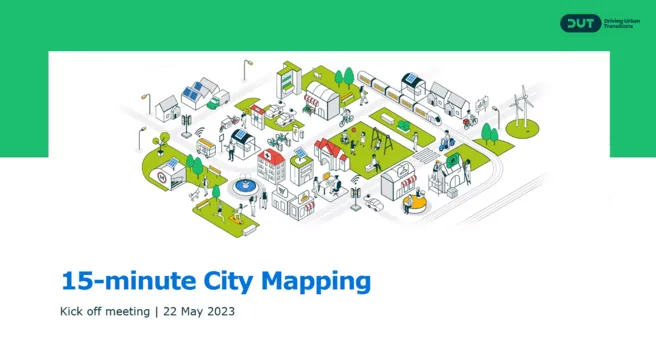We are thrilled to announce the kick-off of our new project, #15minuteCity Mapping, funded by DRIVING URBAN TRANSITIONS PARTNERSHIP (DUT).
Since the mayor of Paris, Anne Hidalgo, campaigned three years ago with the promise to make Paris a 15-minute city, interest in this concept has hardly died down. Since then, numerous cities have joined the 15-minute city goal of sustainable mobility and transport in inclusive and climate-neutral cities.
However, implementing the 15-minute City concept coined by Carlos Moreno requires careful consideration of various factors such as demographics, socio-economic structures, urban morphology, and institutional frameworks. Moreover, the rapid growth of 15-minute City practices renders existing overview studies quickly outdated, creating a pressing need for up-to-date knowledge on international definitions, strategies, and implementation experiences.
To bridge this knowledge gap, the DRIVING URBAN TRANSITIONS PARTNERSHIP has introduced the 15-minute City Transition Pathway. This pathway aims to create a comprehensive 15-minute City Innovation Portfolio, pooling together valuable insights into strategies, policies, and other aspects of implementing this transformative concept. Starting from 2025, the portfolio will expand annually with over 10 new examples.
The cornerstone of this ambitious project lies in the 15-minute City mapping activity, which provides an initial overview for the Innovation Portfolio. By employing robust analytical methods, we will gather international experiences, tools, and best practices, paving the way for subsequent phases of the 15-minute City Transition Pathway roadmap.
Aligned with the DUT's approach, we view the 15-minute City concept as a mosaic of measures and activities across four key areas: personal mobility, urbanplanning and publicspace, urban logistics, and innovative governance. These areas will serve as the primary categories for mapping international experiences and identifying key criteria and elements for in-depth case studies. By exploring and sharing global expertise, we can accelerate the transition toward sustainable, inclusive, and vibrant cities.
TUM Accessibility Planning is proud to be taking the project lead in collaboration with the University of Westminster and the Universidade do Porto. Join us on this transformative journey as we shape the future of cities one step at a time.
Our sincere gratitude to DRIVING URBAN TRANSITIONS PARTNERSHIP (DUT) for their support and belief in our vision demonstrate a shared commitment to creating sustainable, people-centric cities that prioritize well-being, accessibility, and environmental stewardship.
More infromation can be found here.
DUT Partnership:
Maximilian Jäger, Margit Noll, Johanna Holli
Consortium:
Benjamin Büttner (project coordination), Sebastian Seisenberger, Cecília Silva, João Teixeira, Enrica Papa, Maja Piecyk, Julian Allen
